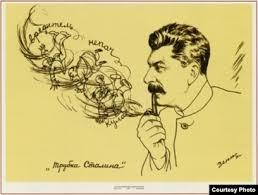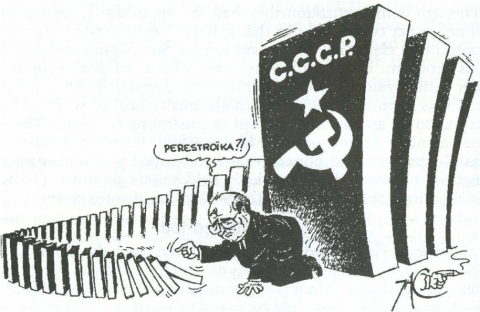
En todos los países socialistas, las bromas eran una forma de que la gente común, así como los intelectuales, desahogaran sus frustraciones para superar esos tiempos difíciles. Por supuesto, las bromas sobre el Estado, Tito, el Partido, el JNA y la Hermandad y la Unidad se castigaban con al menos seis meses de prisión. Aquí hay una por dos años y medio:
Yugoslavia ganó el primer lugar en la Feria Mundial de las Flores, ¿y saben por qué? Consiguieron cultivar una violeta blanca de cien kilos.
Dos años y medio de prisión en Goli Otok por una broma sobre Tito.
Esta es la broma por la que Jennie Lebel, periodista judía de 22 años del periódico Politika de Belgrado, fue condenada a dos años y medio de prisión en Goli Otok en 1949, después de que un compañero de trabajo la denunciara ante agentes de la UDBA.
Esta alusión a Tito, a quien llamaban «violeta blanca» en algunos poemas-odas, era inevitable, por lo que la asociación era inevitable, aunque se expresara en forma de broma, y se interpretó como un acto contra el pueblo y el Estado.
En los países socialistas, se inventaron diversas maneras de engañar a los "guardianes de la revolución" para que divulgaran la verdad. Aquí va una:
Un trabajador alemán de la entonces RDA consigue trabajo en Siberia. Consciente de que los censores leerán toda su correspondencia, les dice a sus amigos: "Establezcamos un código: si la carta que reciben de mí está escrita con tinta azul, es la verdad; si está escrita con tinta roja, es mentira". Un mes después, su amigo recibe la primera carta, escrita con tinta azul: Aquí todo es maravilloso: las tiendas están a rebosar, la comida es deliciosa, los apartamentos son amplios y acogedores, los cines proyectan películas del oeste, hay muchas chicas guapas dispuestas a tener una relación. ¡Lo único es que no hay tinta roja!
Uno de los lingüistas croatas más importantes, el académico Stjepan Babić, miembro de pleno derecho de la Academia Croata de Ciencias y Artes, dedicó toda su vida a recopilar chistes políticos durante la era socialista, que publicó en el libro "Chistes Políticos Croatas" en 1995. Aquí les traemos algunos de los que se decían sobre Tito en aquella época.
Madre
Cuando Tito murió, se encontró con su madre. Ella le preguntó cómo vivía.
– ¿Tenías casa propia?
– No una casa, sino una villa. Y no solo una, sino varias, en Belgrado, en las islas Brijuni, Bugojno, Split, Brdo kod Kranj y en Zagreb –presumió Joža.
– ¿Y tenías coche propio?
– Sí, y ¡menudo coche! Un Mercedes de seis puertas.
– ¿Y luego tenías un televisor a color?
– Y un televisor a color, pero eso no es nada, eso no cuenta, tenía muchas cosas más valiosas.
– Ay, Joža, Joža, y siempre temí que fueras comunista.
Winnetou
El profesor pregunta a los alumnos:
– ¿Quién es el luchador más grande, valiente y noble por la libertad de su pueblo?
Todos guardan silencio, y entonces el pequeño Ivica habla:
– Camarada Tito.
– ¡Qué bien has respondido! – lo elogió el maestro.
Ivica se sentó con la cabeza gacha y susurró para sí:
– Winnetou, perdóname, pero una carrera es una carrera.
Matadero
¿Por qué Tito nunca visitó la industria cárnica de Petrinja?
Porque los trabajadores del matadero colgaron un cartel: "Tito es nuestro".
Calle
¿Sabías que Tito tenía su propia calle en Zagreb incluso antes de la guerra?
– ¿?
– Šloserov stube.
Herencia
– ¿Sabes por qué se agotaron todos los billetes a Belgrado? Para trenes, autobuses y aviones.
– ¿?
– Los habitantes de Zagorje van a la audiencia de la herencia.
Alegría
Padre e hijo están cavando una viña.
– Japa, Tito es un vago – dice el hijo.
– Cállate y cava.
– Japa, Tito es un vago – vuelve a decir el hijo.
-Cállate y cava.
—Japa, Tito es un vago —dice el hijo con impaciencia.
—¡A por todas! ¿Te lo dije? Primero los negocios, luego la alegría.
(Publicado en el libro de Stjepan Babić "Chistes políticos croatas")


Humor under Socialism
By Dragutin Lončar
In all socialist countries, jokes were a way for ordinary people, as well as intellectuals, to vent their frustrations and get through those difficult times. Of course, jokes about the State, Tito, the Party, the JNA, and Brotherhood and Unity were punished with at least six months in prison. Here’s one that got someone two and a half years:
Yugoslavia won first place at the World Flower Fair – and do you know why? Because they managed to grow a one-hundred-kilo white violet.
Two and a half years’ imprisonment in Goli Otok for a joke about Tito.
This is the joke for which Jennie Lebel, a 22-year-old Jewish journalist from the newspaper Politika in Belgrade, was sentenced in 1949 to two and a half years in Goli Otok after a colleague reported her to the UDBA agents.
This reference to Tito, whom some poems and odes called “the white violet,” was unavoidable, so the association was inevitable, even if expressed as a joke, and it was interpreted as an act against the people and the State.
In socialist countries, diverse ways were invented to trick the “guardians of the revolution” into spreading the truth. Here’s one:
A German worker from the GDR gets a job in Siberia. Aware that the censors will read all his correspondence, he tells his friends: “Let’s set up a code: if the letter you get from me is written in blue ink, it’s the truth; if it’s written in red ink, it’s a lie.” A month later, his friend receives the first letter, written in blue ink: “Everything here is wonderful: the shops are overflowing, the food is delicious, the apartments are spacious and cozy, movie theaters show western films, and there are many beautiful girls ready for a relationship. The only thing is, there’s no red ink!”
One of the most important Croatian linguists, academician Stjepan Babić, a full member of the Croatian Academy of Sciences and Arts, dedicated his whole life to collecting political jokes during the socialist era, which he published in the book "Croatian Political Jokes" in 1995. Here are some that were told about Tito at that time.
Mother
When Tito died, he met his mother. She asked him how he had lived.
– Did you have your own house?
– Not one house, but a villa. And not just one, but several: in Belgrade, on the Brijuni islands, Bugojno, Split, Brdo kod Kranj, and in Zagreb – Joža bragged.
– And did you have your own car?
– Yes, and what a car! A six-door Mercedes.
– And did you also have a color TV?
– Yes, a color TV, but that’s nothing, that doesn’t count, I had many more valuable things.
– Oh, Joža, Joža, and I always feared you’d become a communist.
Winnetou
The teacher asks the students:
– Who is the greatest, bravest, and noblest fighter for the freedom of his people?
Everyone is silent, and then little Ivica speaks up:
– Comrade Tito.
– Very good answer! – the teacher praised him.
Ivica sat with his head down and whispered to himself:
– Winnetou, forgive me, but a career is a career.
Slaughterhouse
Why did Tito never visit the Petrinja meat industry?
Because the slaughterhouse workers had put up a sign: “Tito is ours.”
Street
Did you know Tito had his own street in Zagreb even before the war?
– ?
– Šloserov stube.
Inheritance
– Do you know why all tickets to Belgrade were sold out? Train, bus and plane.
– ?
– The people of Zagorje are going to the inheritance hearing.
Joy
Father and son are digging a vineyard.
– Dad, Tito is lazy – says the son.
– Shut up and dig.
– Dad, Tito is lazy – the son repeats.
– Shut up and dig.
– Dad, Tito is lazy – the son says impatiently.
– All right! Didn’t I tell you? Business first, then comes joy.
(Published in Stjepan Babić’s book “Croatian Political Jokes”)
(This text has been translated into English by ChatGPT)
